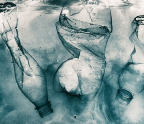
Olivia, age 36, dragged herself slowly into the consulting room. “I’m running on empty,” she said. She slumped in her chair and described how hard it was to get out of bed in the mornings and get through the ordinary tasks of daily life, much less to motivate herself to do anything beyond them.
Olivia said she’d had to give up an interesting academic job that she loved. “My brain had turned to mush!” she said. “I can’t catch my own droughts.” She had very little appetite and yet had put on a lot of weight, which she couldn’t shift, partly because she was too exhausted to exercise. She was cold, constipated and puffy—all the classic signs of low thyroid hormone.
In the preceding eight years, she’d had two cysts removed from a






